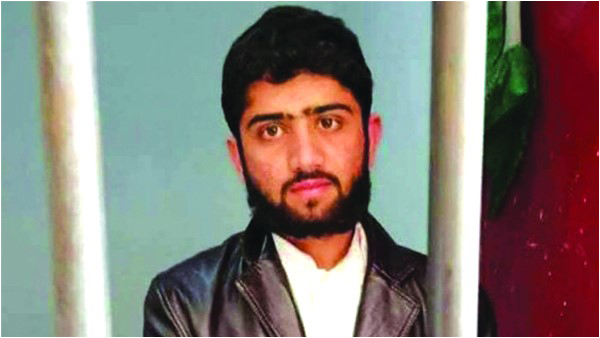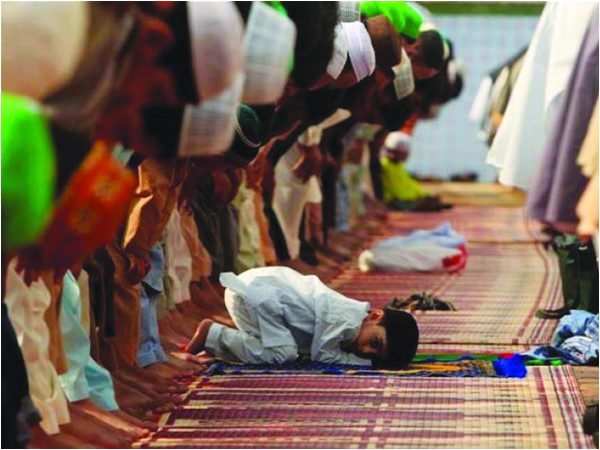
Principal in Charsadda
Sir,
The Human Rights Commission of Pakistan (HRCP) expresses grief and anger at the unchecked shooting of a college principal by a student under the suspicion of blasphemy in the Shabqadar district of Charsadda. The shocking incident occurred after the student had allegedly been reprimanded over his absence from college. The student had reportedly skipped college to attend the Faizabad dharna in November 2017.
In a statement, HRCP stated that: “This killing is yet another shameful reminder of how easy it still is to manipulate the existing blasphemy laws to avenge personal grievances. Blasphemy remains a highly sensitive issue and allegations do not need to be proven before provoking murder.

“Last year, Mashal Khan’s murder by a mob in Abdul Wali Khan University in Mardan led to countrywide outrage and calls for the blasphemy law to be modified. Mashal Khan had been accused of blasphemy over social media although a postmortem investigation of the case found Khan to be innocent.
“It is regrettable that no lessons are being learnt from these incidents and no action is being taken at all by the authorities to prevent such episodes. This incident is further confirmation of the slide toward extreme intolerance in societies on the one hand and, on the other hand, the apathy and inability of the authorities to meet the challenges of extremism.”
Dr. Mehdi Hasan,
HRCP chairperson.
Zainab’s name
Sir,
I write with Zainab in my mind, with tears in my eyes and a shiver running down my spine. Her eyes spoke of a thousand fairytales and innocent dreams. Every time I walk past a heap of trash, I find my soul lying flat, helpless and numb.

We as a society have failed her. The air we breathe whispers her name and reminds us of the helplessness that she once felt. The cold, blood-thirsty hands that once touched her, are choking us but our souls refuse to leave. This everlasting pain and aching thirst that surrounds us today is nothing but our own reflection in the mirror.
We are ashamed of becoming the demons that once frightened her. The moment she went to a better place, angels started taking shelter in the shadow of forbidding darkness that lives within our society. Zainab, the whole country is taking your name today. You are the famous princess you wanted to be…
A brother
HRCP grieves Munnu Bhai
Sir,
The Human Rights Commission of Pakistan (HRCP) has been shocked and grieved at the passing on of Munnu Bhai: poet, dramatist, columnist par excellence and an ardent friend of the poor and the disadvantaged.
His contribution to the democratic dispensation in Pakistan is matchless, particularly during the 1970s and 1980s when Pakistan was under military rule, and is acknowledged by friend and foe alike. In whatever form he expressed himself, he was consistently a partisan of truth and the rights of the people.
HRCP had the privilege of having Munnu Bhai as a member of its governing body for three years and his counsel was always greatly valued by the organization. He will be deeply missed for a long time by all whose lives he touched and the large number of admirers and distant friends.
Dr. Mehdi Hasan,
HRCP chairperson.
Counter narrative
Sir,
Human society is based on human narratives. It is said that If there is no narrative, there is no history. Narratives, therefore, form an essential part of our social cultural milieu. Narratives are also associated with religious phrases which are an elementary constituent of human memory, behavior, rules and ethics. Due to the importance of narratives in society, every intellectual and philosopher has given it due priority and importance. Aristotle, in his epic work Poetics, indicates three essential features of narratives, namely the narrator, characters in the narratives and primary audience of these ideas. In fact, a narrative is an interrelated and coherently organized system of stories, structured or unstructured, having a single focal point for resolving or deflecting a conflict through creating smokescreens, augmenting specific actions and relying on the available audience by tinkering with their expectations and manipulating their emotional attachments on different communication channels.
The stronger the communication medium, the greater is its impact and outreach. Sometimes an effective message becomes weaker when relayed through a soft medium. Likewise, a weak message registers impressive results when transmitted through an effective medium. Another important factor in narrative dissemination is its continuity and persistence. It has three important implications, namely creating a false reality image in the minds of the audience, motivating immature souls to accept external control and engineering impractical hopes in the thinking processes of the poor section of society. Unless a narrative is persistent in its transmission it cannot bear positive results for the narrator. The end product of a narrative is perhaps raising a deceptive mental infrastructure for achieving the desired results.

Though it has rarely been observed that an ordinary person’s recount becomes a social or national narrative, nonetheless, in today’s technologically advanced environment, the electronic and print media can become an impressive carrier of an ordinary anecdotal narration and becomes a tool for social change. In December 2010, the narrative of a hawker in Tunisia, Muhammad Bouazizi, who sets himself on fire due to state repression, received such acceptability among the masses that a movement started which resulted in intense rioting, thus forcing Ben Ali, the then president of Tunisia, to leave office unceremoniously.
Abu Bakr Naji, in his book, Management of Savagery, has produced religious texts to legitimize brutal actions of insurgents in Iraq. He has also propounded the narrative of the Caliphate to give authenticity to the mode of recruitment of Al-Qaida and other extremists in the Middle East. These ideas, when heard and read by a common person, ignite extremist notions which lead towards brutality and savagery. Hence narratives can also provide legal sanction to commit crime as well.
In Pakistan, the terror narrative has been established on multidimensional fora. These include promises of speedy justice, propagation of social equality, claims of purging society of social ills and imposing Sharia principles in day-to-day dealings. Terror organizations have used these narratives to legitimize their actions against state institutions including the military, paramilitary, law-enforcement agencies and the population at large.
These groups operate at global, regional, national, sub-national and local levels. They employ different means for propagation of their narratives, which include written material and pamphlets, audio and video messages, interviews in electronic, print and social media. They also use books to radicalize their followers along with exploiting the latest telecommunication services including SMS. Moreover, anti-western and takfiri ideology is being promoted through these narratives. A counter narrative is therefore required to develop a strong response to the prevailing terror narratives.
A counter narrative is like running water which needs to be accelerated through a channel so that it gives you the desired result. The first and foremost factor in counter terror narrative development is strengthening of institutions so that they project the counter narrative line of action in an impressive and effective manner. The existing rules dealing with terror-related incidents need to be aligned with our counter-terror narrative. For example, we emphasize that hate literature and speech should be completely banned. However, while processing such cases the inability of the institution to collect proper material evidence and present them in a court of law gives unnecessary leverage to the culprits, resulting into acceptance of their bail applications which further promotes their narratives. Recently the culprits involved in the Benazir Bhutto murder case were acquitted by an anti-terror court on the basis of a lack of evidence.
The Paigam-e-Pakistan decree issued by 1,829 religious scholars and ulema has focused on three important areas. First, it has emphasized national unity to fight against the menace of terrorism. According to the document, the Constitution of Pakistan provides the basis of national integration and cohesion. Second, the leaders and state institutions should play their part in providing an environment of mutual harmony and trust. The responsibilities of different institutions and their failure in discharging their duties faithfully is one of the main reasons for hatred and a lack of consensus among citizens. Third, Islamic teachings should be properly interpreted and explained in the light of the Holy Quran. Wrong interpretations breed sectarianism which ultimately leads to intolerance. The state must be the ultimate decider of everything. It should be the sole authority which can declare jihad against an enemy, foreign or native. The real challenge will be the implementation of the counter terrorism narrative.
The counter narrative should be accompanied by powerful action so that the present state equilibrium is disturbed and a new balance is created in accordance with the wishes of the narrator. A comprehensive strategy should therefore be chalked out in disseminating the counter terror narrative among the citizens of the state through an effective and productive medium in a simplified manner. The moment a poor person starts understanding its contours and themes, terror narratives will face a tough response on psychological and practical levels in Pakistan.
Faisal Ali Raja,
Senior Police Manager /Supervisor,
MPA Columbia University, NY,
Fulbright Scholar (2009-11)

